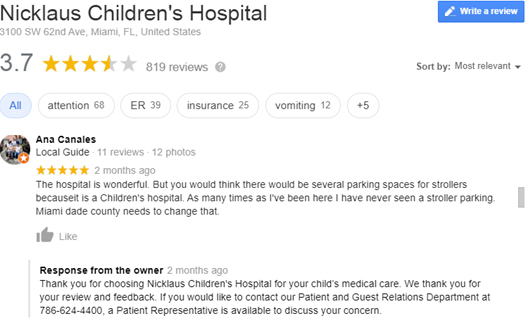The healthcare domain has become highly competitive with more healthcare providers and innovative medical technologies making their appearance. Physicians, hospitals and health systems overall have recognized the growing significance of medical SEO. Building strong online visibility is important for the success of any medical practice as it helps attract potential patients and healthcare consumers. Nowadays, before choosing a healthcare practice or consulting a physician, it is quite common for individuals to go online to know more about the physician or his/her services. The relevance of reviews becomes evident here. Reviews are important for any medical business. Whether online reviews, opinions or feedback, reviews are one of the most trusted and frequently used sources for patients. Online reviews are made by existing patients and these can help future patients to make an informed decision. Reviews can either be positive or negative. While positive reviews are encouraging and will help attract more patients, negative reviews are a sign that there is more room for improvement of services. Importantly, one cannot simply ignore negative reviews. It is important to acknowledge them and respond in the best way possible.
Importance of Online Reviews
Gathering patient reviews can be valuable for strengthening the online reputation of a medical practice. However, obtaining positive reviews is a real challenge. This is because patients are motivated by their own goals, so it is not their responsibility to provide your medical practice with feedback. In fact, many patients are reluctant to fill out surveys or respond to requests to provide reviews due to the inconveniences these activities can cause. Some others may be skeptical of the questions that may be asked and may not feel comfortable with providing honest feedback. This is where creativity and expert tips may come in to play.
Online reviews are a trust signal. More healthcare consumers than ever consider patient reviews as influential when looking for a provider. According to recent research reports, about 69.9 percent of consumers see positive patient reviews as “very” or “extremely” important. 72 percent use reviews as the first step to finding a new physician. It is estimated that 60.8 percent consumers avoid physicians based on negative reviews.
Why Are Many Healthcare Practices Skeptical About Online Reviews?
Generally, many healthcare practices struggle with reviews. One of the most common problems is that many healthcare practices are uncomfortable asking for reviews. Providers fear that it will strain the patient relationship. The second problem is that if at all these practices ask for reviews, they don’t get many. This means that they are not asking in the right way, at the right time and with the right tools.
Local Listings – The Foundation of Reviews
One of the initial steps before expanding your patient review collection is to ensure that your local location listings contain the correct information. Start with Google My Business – one of the top review platforms. The information generated via this platform can easily be syndicated to other directories beyond Google. This can be done using listing management tools which can be found online with a simple Google search. However, make sure to read the fine print to understand the key features and limitations of the listing tool selected. One common challenge with listing management is that healthcare practices often have listings for both the practice as well as the physician. As Google allows listings for both the physician and the practice for one single location, this can cause issues because review management platforms / directories may view them as conflicting locations as they share the same address.
So, it is highly recommended that business listings on review management platforms should be focused on the practice, not the physician. There are separate platforms just for physician reviews that can help you create and share those physician listings to the appropriate platforms. However, it is important to have a proper strategy to grow both the healthcare practice and physician reviews.
Why is Review Marketing Important for Physicians – Top Strategies
A patient review strategy helps improve the brand reputation, attract the interest of patients, increase revenue and create more buzz about the medical practice now and in the long run. In most cases, patient feedback can come in the form of reviews, private emails, star ratings and video testimonials. Patient feedback can be used to encourage prospects to visit your healthcare practice and avail your services. Patient reviews can also impact search engine optimization (SEO). A well-written review with the right keywords can make your healthcare practice appear in Google searches and increase your online footprint.
It is important to remember that there is no one-size-fits-all approach for increasing patient reviews. No matter, you get reviews from multiples sources or from a handful of sites like Google, Facebook, Yelp and Healthgrades, it is important to devise a clear-cut strategy to get more patient reviews –
-
- Set up profiles on top review sites – One of the initial steps is to select third-party review sites that are relevant within the healthcare industry, attract users and show up results when your medical practice is searched online. For most healthcare practices, a combination of Yelp, Facebook, and Healthgrades is more than enough. Once the review sites are shortlisted, set up accounts.
- Ensure compliance – Some review sites, for instance, Yelp – disfavor healthcare providers asking patients for reviews. On the other hand, sites like Google are just the opposite, allowing marketers and providers to proactively ask for online reviews. When you try to reach out to patients to give reviews about your healthcare practice, make sure that your efforts are in compliance with each individual review site’s guidelines.
- Ask patients – Asking patients is one of the best ways to increase reviews for your healthcare practice. Patients know the relative importance of reviews to your healthcare practice and as long as you provide excellent service, they may be glad to do a review. When patients compliment your service via phone, email or personally, make sure to tell them to leave their feedback via a review on your website, or Yelp, or the review website of their choice.
- Selectively identify patients for reviews – One of the simplest strategies to increase reviews is to ask the patients in person about their experiences. If you know someone who had a positive experience, encourage them to share it for the benefit of other patients, as well as the growth of your practice. It is often best to ask them in person, with a follow-up email to remind them a day or two after their visit.
- Automate Email requests for reviews – Automating email requests is one of the top ways for medical practices to collect reviews and it is the best strategy that is likely to have the most impact on generating a large number of reviews. To attract the best possible response, send a review request email within a week of the appointment to take advantage of the positive feelings. Timing can make a significant difference between positive and negative reviews, so it is important to establish rules. For instance, if you are a plastic surgeon performing a tummy tuck, never try to send out that request a few days after the surgery, but rather after a follow-up appointment. Ideally, this should be a completely hands-off process automated through your email system. One of the best ways to automate review collection via email is to use a customer relations management system to create a definite workflow that will send an email request to specific patients individually once they fulfill the conditions outlined.
- Make it convenient for patients to leave a review – Make it easy and convenient for patients to leave reviews as this will help attract more patient reviews.
- Consider taking reviews in your healthcare practice – Collecting reviews in your office before or after patient appointments is another important strategy. This can help attract reviews from the patients when your practice is top of mind.
- Respond to existing reviews – When a patient leaves a review, he/she normally expects a response to their feedback. However, it is estimated that two-thirds of patients never get a response. Responding to patient reviews shows that you care for their opinion – which is extremely important for any healthcare organization. Patients, at most times want to know whether their reviews are valuable and can contribute or effect the way a provider perceives patient care and experience. While responding to reviews, organizations need to be aware of the existing HIPAA guidelines to protect patient data. One way to avoid this issue is to create pre-drafted responses. For instance, the marketing team at “Nicklaus Children’s Hospital, Miami FL, United States”, notifies the reviewer that the hospital is aware of their comments. They also encourage patients to take the conversation offline and provide more detailed feedback. With such carefully-worded responses, any healthcare organization can influence each review to improve the experience of patients and show them that their current and future feedback is important.
Source-https://www.google.com/search q=nicklaus+children%E2%80%99s+hospital&rlz=1C1GIWA_enIN868IN868&oq=&aqs=chrome.0.69i59l8.13575972j0j7&sourceid=chrome&ie=UTF-8#lrd=0x88d9b83e1752a3d1:0xb330b6a398f9af10,1,,,
-
- Respond to negative reviews – Before responding to negative reviews, make sure to check your records to see whether the review posted is genuinely by one of your patients or customers. If not, it could well be a fake review. Whatever be the negativity conveyed in the review, make sure your responses are all positive. Address the complaint specifically. Your responses must address the following points –
- Thank the reviewer for their genuine opinion
- Point out your specific concern
- Apologize for the trouble caused and be honest about any mistakes made by your practice
- Acknowledge the reviewer’s concern as genuine, and if you feel it can’t be true, follow the next step
- Explain the possible reasons for the person to have felt wronged
- Provide a contact number to the concerned individual for the complaint to be fully redressed
Source-https://www.google.com/search?q=nicklaus+children%E2%80%99s+hospital&rlz=1C1GIWA_enIN868IN868&oq=&aqs=chrome.0.69i59l8.1176652j0j7&sourceid=chrome&ie=UTF-8#lrd=0x88d9b83e1752a3d1:0xb330b6a398f9af10,1
- Respond to negative reviews – Before responding to negative reviews, make sure to check your records to see whether the review posted is genuinely by one of your patients or customers. If not, it could well be a fake review. Whatever be the negativity conveyed in the review, make sure your responses are all positive. Address the complaint specifically. Your responses must address the following points –
- Publish reviews on your website – Publishing reviews on your healthcare website has several advantages. These include –
- Patients can read reviews, ask questions, and mark reviews as helpful or unhelpful.
- Other patients can see that people are happy with the services.
- Original, user-generated content is great for ranking and SEO.
If the reviews are generally positive, make sure to share them via social media channels and display them on your website.
- Incentivize (if appropriate) – Consider incentivizing the patient review requests. However, it is important to do this carefully. No matter what specialty you are serving, you never want to let others know that you are paying patients to write positive reviews about your practice. For instance, healthcare practices can give offers to patients like anyone who writes a review in a specific month will be eligible for a free consultation.
Patient reviews are a powerful tool that every healthcare practice must utilize correctly to increase patient volume and strengthen online reputation. Obtaining positive reviews from patients and reducing the impact of negative reviews are the major considerations when it comes to healthcare digital marketing. Healthcare providers must ensure that reviews regarding their services are regularly monitored and identify any concerns patients may have and address them appropriately. By incorporating valuable reviews in the content strategy and using them as a channel to connect with patients, healthcare practices can establish an engaging brand. However, growing reviews doesn’t usually happen overnight and in most cases, patients may not take the time to write reviews. By carefully considering the above-mentioned strategies, healthcare practices can increase both the quantity and quality of the reviews they receive, and establish a brand that is engaging and trustworthy.






